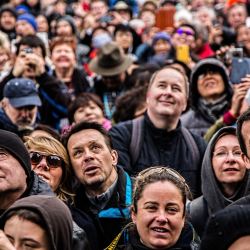Front-line essential workers – that’s a great phrase, but what does it mean? Are Congressmen and their aides really “essential workers”? [1]
The Advisory Committee on Immunization Practices (ACIP) has been tasked with creating guidelines for the queue to receive the COVID-19 vaccines. While we are dawdling through the first phase of healthcare workers and nursing home populations, the next group to be queued up includes essential workers. As with all things bureaucratic, the Department of Homeland Security has defined essential workers, which includes among others
- first responders (e.g., firefighters and police officers)
- corrections officers
- food and agricultural workers
- U.S. Postal Service workers
- manufacturing workers
- grocery store workers
- public transit workers
- teachers and support staff members
- child-care workers.
“All politics are local.”
Former Speaker of the House Tip O’Neil, the author of that quote, had it right. Local politics and the situation on the ground dictate policy implementation. As Homeland Security writes,
“State, local, tribal, and territorial governments are responsible for implementing and executing response activities in their communities…[and] critical infrastructure owners and operators are expected to use their own judgment on issues of the prioritization of business processes and workforce allocation”
Moving public transportation up in New York makes a great deal of sense, not so much in Los Angeles – that is why these decisions should be local. That is also you see long lines of “elderly” being vaccinated in Florida and Texas but not in New York or California.
The Kevin Bacon Problem
Here I am alluding to the six degrees separating you from knowing Kevin Bacon. For essential workers, this problem has to do with their support workers. How many linkages away can you be and still be considered necessary. For first responders, their support system includes
- Personnel involved in 911 services – this includes those answering and maintaining the phones.
- Vendors who make equipment to supply law enforcement and fire companies with their tools, safety equipment, and workers producing ammunition and running shooting ranges. “
You can find a similar set of support staff for another essential service K-12 teachers, among others
- “bus drivers, crossing guards, cafeteria workers, cleaning and maintenance workers, bus depot and maintenance workers
- “administrators, administrative staff, IT specialists, media specialists, librarians, guidance counselors, school psychologists, and other mental health professions, school nurses and other health professionals, and school safety personnel.”
Librarians and media specialists, manufacturers of ammunition, shooting range operators? We all like to believe that we are essential, especially when it comes to getting to the front of the line. Among the special interest groups lobbying to move up, we find Uber and Lyft and camp counselors, even the Fraternal Order of Real Bearded Santas. Could we all agree that bankers can wait?
Essential workers are deeply entangled in our lives; that is the essence of being essential. The ACIP is being asked to divide the baby, making some essential workers more essential than others. The ACIP tried to make these divisions based on where the vaccine could create a safer work environment that would, in turn, speed up re-opening our economy and lives. All of the back and forth between the Department of Education and the teacher’s union in New York City revolved around these issues. Vaccination ends the back and forth; it makes the workplace of these essential workers safe.
While ACIP indicates that it wants to follow the science, there is precious little real information about which of these essential services and their Kevin Bacon relations are the most critical or most at risk – we simply do not know. So that is why local officials are being tasked with making the choices, why you can expect pushback from various interest groups, and why these are, in the final analysis, political decisions.
[1] Congress built a bomb shelter in case of a nuclear attack in the late ‘’50s. At the time, only Representatives or Senators, along with one aide, would be sheltered. As Politico reports, “Spouses and family members will not be eligible to receive a vaccine from the congressional supply.” Back in the ’50s, when the spouses found out, the rule was quickly changed to allow Representatives, Senators, and their families (all children under age 18) to be sheltered.

